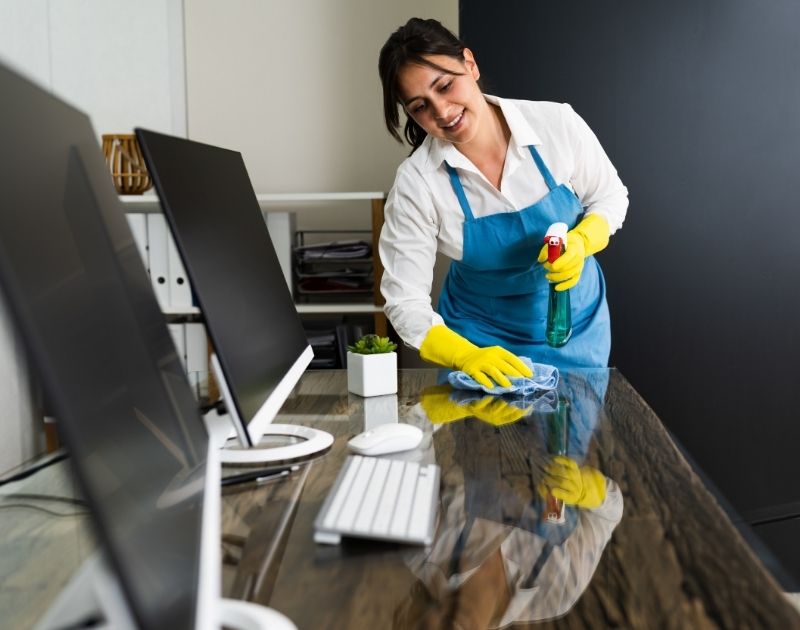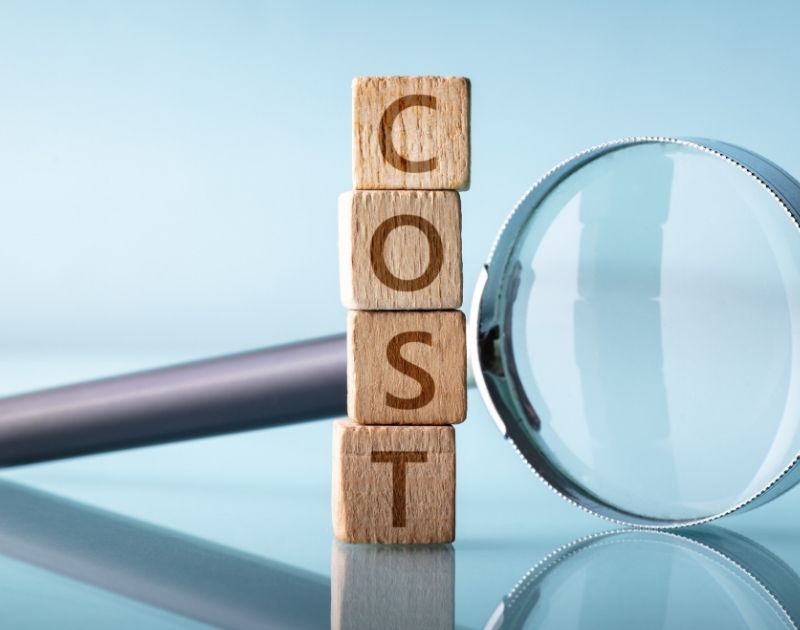Maintaining a clean and germ-free office desk is about more than just neatness – it’s a matter of employee health, productivity, and wellbeing. For HR professionals, office managers, and business owners, promoting good desk sanitation can lead to fewer sick days and more engaged, productive employees. In this comprehensive guide, we’ll explore research-backed tips to keep office workstations sanitary and highlight how a professional partner like Assett Commercial Services can help ensure a healthier workplace. We’ll also naturally integrate key considerations around Commercial Cleaning Services and Janitorial Services, emphasizing their role in sustaining a clean office environment.
The Hidden Health Risks of a Dirty Desk
Office desks might look innocuous, but studies show they can harbor astonishing numbers of germs. In fact, the average office desktop carries around 10 million bacteria – roughly 400 times more germs than a toilet seat. Our hands transfer microbes to keyboards, mice, phone handsets, and the desk surface all day long. Without regular cleaning, these germs (including potentially dangerous bacteria like E. coli and Staph) can survive on surfaces for hours or even days according to cbsnews.com. Viruses that cause colds or flu may linger on hard surfaces for up to 48 hours, ready to infect the next person who touches that desk and then their face.
The consequences for employee health are significant. Research reveals that over two-thirds of office workers are at risk of illness due to dirty desks. The average desk harbors about 21,000 germs per square inch on its surface – plus 3,000+ per square inch on the keyboard, 1,600+ on the mouse, and a whopping 25,000 on the phone. (By contrast, an office toilet seat has only about 49 germs per square inch!) Such germ concentrations make it easy for infections to spread when employees share phones or workstations or even just touch communal surfaces like copier buttons after touching their desk. Every time someone eats lunch at a contaminated desk or forgets to wash their hands, they could be exposing themselves and colleagues to harmful microbes. The result is more frequent colds, flu outbreaks, and even gastrointestinal illnesses circulating in the office.
Importantly, these germs translate into real costs in terms of sick leave. When one person gets sick, it can quickly ripple through a workplace. Illness-related absenteeism is already a major drain on businesses – U.S. businesses lose about 2.8 million workdays each year due to employee illnesses and injuries. Unsanitary desks contribute to this problem by giving viruses and bacteria a foothold to infect more employees. That’s why medical professionals and HR experts alike stress the value of regular cleaning: failing to clean regularly with antibacterial wipes can encourage dangerous bugs to breed on surfaces. In short, a dirty desk isn’t just gross – it’s a health hazard that can undermine your workforce.
A Clean Desk = A More Productive, Happier Workforce
Beyond the direct health impacts, a clean workspace has significant productivity and morale benefits. Employees simply work better in a clean environment. According to a survey by Staples, 94% of workers reported feeling more productive in a clean workspace, and 77% said they produced higher-quality work in such conditions. It’s hard to concentrate when your keyboard is sticky, your desk is dusty, or yesterday’s coffee rings are staring back at you. A tidy, sanitary desk eliminates those distractions, allowing staff to focus on their tasks with better concentration.
Cleanliness also affects employee mindset. Walking into an orderly, freshly cleaned office each day can boost morale and even job satisfaction. One well-known study found that employees in clean, well-maintained offices were 12% more productive and tended to have higher job satisfaction than those in cluttered, grimy spaces. The psychological lift of a neat workspace should not be underestimated – it signals to employees that their wellbeing is valued, which in turn can increase their engagement and loyalty.
On the flip side, consider the productivity cost of a workplace where people are frequently out sick. When desks and other surfaces aren’t sanitized, illnesses spread more easily, leading to spikes in absenteeism. Consistent cleaning can break this cycle. In fact, workplaces that implement thorough sanitization protocols have seen absenteeism drop by as much as 30–40%m. Fewer sick days mean more consistent staffing, less disruption to projects, and lower costs for the company. Simply put, a clean desk policy is also a smart business productivity policy. Healthier employees who feel comfortable in their environment will not only take fewer sick days – they’ll also be more focused and efficient when at work.
Finally, don’t overlook the impression on clients and visitors. An office that looks and smells clean projects professionalism. While this blog is focused on employee health, it’s worth noting that cleanliness can influence how your business is perceived. (For instance, 86% of consumers in one survey equated the cleanliness of a facility’s environment with the quality of its service or products – a dirty office could quietly erode confidence in your company’s professionalism.) A clean workspace sets a positive tone for everyone who enters.
Research-Backed Office Desk Sanitation Tips
A professional cleaning staff sanitizing an office desk with disinfectant, ensuring germs are eliminated from high-touch surfaces. Maintaining a clean desk requires consistent habits and proper techniques. The following research-backed tips will help reduce germs on office desks and support employee health. Each tip is practical for employees or facility managers to implement and underscores the health or productivity benefits of a sanitized workspace:
-
Wipe Down Surfaces Regularly (Ideally Daily): Frequent surface cleaning is your first line of defense against germs. High-touch areas like desktop surfaces, chair armrests, and drawer handles should be cleaned at least once a day if possible. Regular cleaning with a suitable disinfectant or soap-based cleaner removes microbes before they multiply. In fact, studies show that using disinfectant wipes on desk surfaces can achieve a 99% reduction in bacteria levels over a 48-hour period. Conversely, if you neglect cleaning, bacteria on office surfaces can rebound quickly – research found that without disinfection, bacteria counts on phones and keyboards can rise by up to 30% in just one day. For busy offices, a daily quick wipe-down of the desk, keyboard, mouse, and phone is ideal, especially during cold and flu season. Always follow proper technique: clean first (to remove dust and grime) and then disinfect. Simply dusting the desk or swiping it with a dry cloth won’t kill germs – in fact, it may just spread them around. Use an appropriate cleaning agent (or disinfectant wipes) and get into the nooks and crevices (such as keyboard keys and desktop corners). By making daily desk wiping part of the routine – for example, providing employees a few minutes at the end of the day to sanitize their area – you dramatically cut down the microbial load that employees come into contact with each morning.
-
Disinfect High-Touch Items (Keyboard, Mouse, Phone) Frequently: It’s easy to wipe the obvious flat desktop and forget the devices on it. However, those devices are germ magnets. Recall that the average phone handset hosts about 25,000 germs per square inch, and keyboards over 3,000 per square inch. These items directly touch hands and faces throughout the day, so keeping them sanitized is critical. Provide electronic-safe disinfectant wipes for employees to use on their keyboard, mouse, and telephone at least a couple of times per week (daily for shared or common phones). One prior study found that keyboards – especially shared ones – can harbor dangerous bacteria like E. coli, Staph aureus, and Streptococcus, which can survive on those plastic keys for up to 24 hours. To clean these items: power down electronics if possible, wipe all surfaces (don’t forget mouse buttons and phone keypads), and allow them to air-dry for the contact time recommended on the disinfectant product. Regularly disinfecting these high-touch tools will significantly reduce the spread of pathogens among your team. Consider also encouraging employees not to share devices like headsets or mobile phones without cleaning them first.
-
Avoid Eating at Your Desk: Lunchtime and snack breaks might seem convenient at the desk, but they can undermine sanitation efforts. Food crumbs and spills create a breeding ground for bacteria right on the area where you work. Not only is a desk an unhygienic surface to eat from, but the crumbs and spills that inevitably occur provide the perfect environment for bacteria to thrive. Those sandwich crumbs that fall between keyboard keys or coffee spills that don’t get wiped up become nutrients for germs, which can multiply dramatically. Moreover, eating at the desk often means hands and surfaces get coated with food bacteria (think about touching your mouse with mayo or sauce on your fingers). It’s far healthier to have employees eat in a designated kitchen or dining area, then wash their hands before resuming work. If one must eat at the desk occasionally, enforce a clean-up rule: all surfaces should be cleaned immediately after the meal, and any trash disposed of (leftover food in wastebaskets also attracts pests and more bacteria). By keeping food away from the desk, you reduce the introduction of new microbes and make it easier to maintain a consistently sanitary workspace.
-
Declutter and Organize Your Workspace: A cluttered desk is not just a productivity drain – it also makes effective cleaning much harder. Piles of papers, knickknacks, and personal items covering a desk surface prevent janitorial staff or the employee from wiping all the nooks and crannies where dust and germs accumulate. Over time, that untouched clutter can become a magnet for bacteria and dust. Encourage a “clean desk policy” where employees tidy up unnecessary items at the end of each day. Use organizers or drawers to store loose papers and stationery rather than leaving them scattered on the desktop. The benefit is twofold: it’s psychologically refreshing to start work on a neat desk, and it allows cleaning staff to thoroughly sanitize the surface each time. Make a habit of decluttering at least once a week – file away documents, throw out trash, and remove items that don’t need to be on your desk. Also, consider the equipment: dust on computer monitors, cables, and under desk accessories can harbor allergens and germs, so those areas should be kept accessible for dusting and disinfection (including “high dusting” of shelves or cubicle walls as needed). The more open and organized the desk area, the more effectively you or your cleaning crew can keep it germ-free.
-
Promote Hand Hygiene and Provide Cleaning Supplies: Even the cleanest desk won’t stay that way if employees re-contaminate it with dirty hands. One of the most reliable ways to prevent infection from surfaces is to regularly wash hands or use hand sanitizer, according to the CDC. Employers should actively encourage hand hygiene in the workplace – for instance, place sanitizer dispensers near desks or common areas and put up gentle reminder signs about washing hands after using the restroom or before eating. By keeping employees’ hands clean, you reduce the number of germs that get transferred to keyboards, phones, and desktops in the first place. Alongside this, make sure that cleaning supplies are readily available for staff. Stock each department or office area with disinfectant wipes, cleaning sprays, microfiber cloths, and gloves (if needed) so that wiping up spills or doing a quick sanitize is convenient. Many offices create a “sanitation station” with essentials like wipes and hand sanitizer that anyone can grab as needed. You can even integrate desk cleaning into the culture: for example, institute a weekly five-minute clean-up break where everyone disinfects their immediate work area. When employees have the tools and time to clean, they’re far more likely to maintain their spaces. This proactive approach, combined with personal hygiene, forms a strong defense against the spread of germs in the office.
-
Schedule Regular Deep Cleaning by Professionals: While daily self-maintenance is vital, nothing replaces a thorough, professional cleaning on a routine schedule. Professional commercial cleaning services bring specialized tools, stronger disinfectants, and expert techniques to sanitize areas that might be overlooked in day-to-day cleaning. Consider arranging for janitorial staff or an external cleaning company to deep-clean workstations on a weekly or bi-weekly basis (or more frequently for large, high-traffic offices). This should include tasks like vacuuming and shampooing desk chairs (fabric can harbor dust mites and germs), steam cleaning or disinfecting shared equipment, and intensive cleaning of all surfaces and touchpoints. Professional commercial janitorial services implement evidence-based cleaning protocols systematically, ensuring regular disinfection that prevents the spread of illnesses. They can reach areas like under desk cables, phone handsets, and drawer pulls that busy employees might neglect. Research has shown that by reducing germs through professional cleaning, companies can significantly cut down on sick leave and keep more workdays productive. In other words, bringing in the pros is not just an added expense – it’s an investment that pays off in healthier staff and sustained productivity. Professional cleaners also know how to handle cleaning chemicals safely and use the right product for each surface (protecting your office furniture and IT equipment from damage). For example, they’ll use alcohol-based disinfectants on electronics, appropriate cleaners for wood or laminate desks, etc., to both sanitize and preserve your assets. If you don’t already have a janitorial service schedule, evaluate your office’s needs: many businesses find that a nightly cleaning crew or at least a weekly deep clean of all desks greatly reduces employee complaints about cleanliness and cuts down on illness transmission at work.
By implementing these six tips, an office can maintain a far healthier desk environment. Employees will not only feel better (fewer sniffles and sick days), but also appreciate the improved workspace – leading to better morale. Next, we’ll discuss how partnering with a professional service can amplify these efforts and why Assett Commercial Services stands out as a leader in this area.
Why Choose Assett Commercial Services for Office Sanitation
Even with diligent in-house efforts, partnering with the right professional cleaning service can take your office sanitation to the next level. This is where Assett Commercial Services comes in. Assett is a trusted provider of Commercial Cleaning Services and expert Janitorial Services, with a proven track record of helping businesses maintain spotless, hygienic workplaces. Assett Commercial Services is a family-owned company (founded in 2019) that merges 21st-century cleaning technology with proven methods to deliver a superior cleaning experience. For office managers and business owners, choosing Assett means gaining a reliable partner dedicated to your employees’ health and safety.
Assett’s professional janitorial team can care for your facility up to 7 days a week, customizing their services to your specific needs. This flexibility ensures that whether you require nightly office cleaning or periodic deep cleans, Assett will tailor a schedule that keeps your desks and entire workplace consistently sanitized. Their trained staff handles the dirty work efficiently and discreetly, so your own team can stay focused on customers and core business tasks. No more coming in on Monday to find last week’s dust or coffee stains – Assett helps you “start every day clean,” as they like to say.
When it comes to sanitizing office desks and high-touch surfaces, Assett uses advanced, health-conscious solutions. For example, they utilize a patented disinfectant that is safe for people and equipment. This means your desks, keyboards, and phones can be thoroughly disinfected without harsh chemical residues or damage to electronics – a crucial consideration for any office environment. Assett’s cleaning protocols align with CDC recommendations and industry best practices, focusing on proper surface disinfection, frequent touchpoint cleaning, and use of EPA-approved cleaning agents. By following these evidence-based methods, Assett helps reduce the spread of germs in your workplace, contributing directly to fewer employee illnesses. (As noted earlier, rigorous cleaning can lead to 30–40% fewer sick days – Assett’s services are designed with this kind of impact in mind.)
Another benefit of choosing Assett is the breadth of their services. They are truly a one-stop solution for facility cleanliness. In addition to routine desk and office cleaning, they offer day porter services – meaning if your facility needs extra touch-ups during the day (for instance, cleaning conference rooms between meetings or keeping restrooms sanitized), Assett can handle cleaning even while your facility is open and operating. This is ideal for high-traffic offices or buildings that run multiple shifts. Assett also provides specialized cleaning options like floor polishing, window cleaning, carpet deep-cleaning, and more, ensuring every aspect of your workspace contributes to a healthy environment. And as a locally operated, family-owned firm, they pride themselves on attention to detail and customer satisfaction. Assett’s clients know they can expect consistency, quality audits, and responsive customer service if any area needs extra attention.
Ultimately, Assett Commercial Services brings peace of mind. You can trust that your office desks (and the whole workplace) are being cleaned by professionals who genuinely care about hygiene and health outcomes. Their combination of reliable service, modern disinfection technology, and customized plans makes them an invaluable partner for organizations prioritizing employee wellbeing.
Call to Action: A cleaner, healthier office is within reach. If you want to boost employee health, reduce sick days, and enhance productivity through a cleaner workspace, it’s time to consider Assett’s expertise. Contact Assett Commercial Services today to discuss how their commercial cleaning and janitorial services can be tailored to your business. Let Assett help you create an office environment where every desk is a productive, healthy space – your employees (and your bottom line) will thank you for it!




